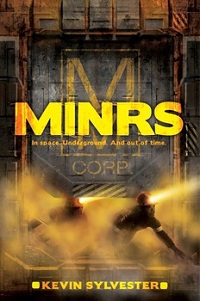| ________________
CM . . .
. Volume XXIII Number 7. . . .October 21, 2016
excerpt:
Christopher Nichols, 12, lives with his family on Perses, a mining colony on a new planetoid near the Earth’s orbit. As the colony holds a party before a “blackout” of communications while the Earth is on the other side of the Sun, it is savagely attacked by unknown forces landing in a giant cargo spaceship. Before he dies defending the colonists, Christopher’s father gives him a map to a hidden emergency beacon and tells him to go deep into the mines and lead the small group of child survivors until the two-month blackout is over. The group struggle to find food, medical attention, psychological support, and safety as they conduct guerilla raids against the invaders to slow down their processing of precious metals before they inevitably leave the colony and destroy what remains. Despite incredible odds, the group eventually succeed in killing all the invaders in their own ship in a suicide mission led by shell-shocked Alek. MINRS is a highly charged, extremely taut thriller by an author who has long been adept at action, complex plots, and almost implausible youth heroics. Impossible to put down, the action is beguiling, mixing incredible tragedy and soaring hope with incredible potency. Christopher’s struggle to decode his father’s “map”—a copy of Oliver Twist with cryptic numbers written in hidden ink—is soaked in his own difficulty in realizing he is an orphan just like Oliver. The characters are highly modern and well-drawn—Christopher is resourceful but wracked with self-doubt; five-year-old Darcy deals with tragedy using innocent play; Alek is so damaged by his sudden orphanhood that he refuses to eat, and he saves the group in the end in a selfless act of replacing Christopher on the final mission (recalling another Dickens classic, A Tale of Two Cities). But it is the strikingly strong female characters that raise the heroism bar—Elena, the hawkish military-history buff, and Fatima, the indentured slave fighting for her own survival. The classic love triangle between the two of them propels the wrenching survival and strategic decisions the group has to make, each of them goading nominal leader Christopher to more decisive action. Both shut down their emotions in order to keep strong—Elena dealing with having to pretend to be dead while all the adults were killed, Fatima dealing with being left for dead in a cage with the rest of the slaves—in a way that Christopher can’t quite muster. (A third adolescent girl, Mandeep, is also notable for her medical skills, and contributes to the multicultural nature of the cast). As with most great science fiction, the book raises complex moral and scientific questions—most notably, the discovery of Fatima and the other “grinders”—indentured slaves used as human fodder to mine seams too small for adults—that Christopher and the rest of his privileged peers were unaware of. If an extraterrestrial mine is set up to save a resource-depleted Earth, is it acceptable to use child labour for the greater good? The questions are haunting, but the book is never moralistic. There are, inevitably, some fantastical excesses to the story, not just in the incredible heroism (and luck) of the young cast, but in the technology of the colony, itself. The grinders explain their existence as being because shipping kids from Earth is cheaper than shipping specialized machines, yet the group is blessed with the availability of a fleet of “diggers” that use nuclear disruption to dig tunnels with little danger. Not only is Christopher skilled at operating one (his father having sneaked him into a digger at work), but he is able to train many of the others to such a degree that they pass undetected under the invaders’ loading dock on raids, and he is able to jury-rig them twice to trigger nuclear explosions. Somehow, he even covers up the hole his digger makes in a food storage silo while the digger still sits straddling the hole! And it would have been good to have an explanation for the concept of the “core-scraper” that is at the centre of the underground living/mining complex of the colonists (it seems to be a cylinder created by the original boring of the hole, but sometimes seems more like a glorified elevator shaft). But these are minor details, and like all great fantastical literature, the ability of the narrative to shut down the reader’s natural disbelief is much more powerful. And although the book seems to end on a happy note—Christopher recovering in the damaged hospital after the invaders are destroyed—there is quite obviously a sequel coming: the first message from Earth after the blackout ends is to tell them “they are coming to get you....hide.” A wild ride that few readers will want off. Highly Recommended. Todd Kyle is the CEO of the Newmarket Public Library in Ontario and President of the Ontario Library Association.
To comment
on this title or this review, send mail to cm@umanitoba.ca.
Copyright © the Manitoba Library Association. Reproduction for personal
use is permitted only if this copyright notice is maintained. Any
other reproduction is prohibited without permission.
Next Review | Table of Contents For This Issue - October 21, 2016 |
